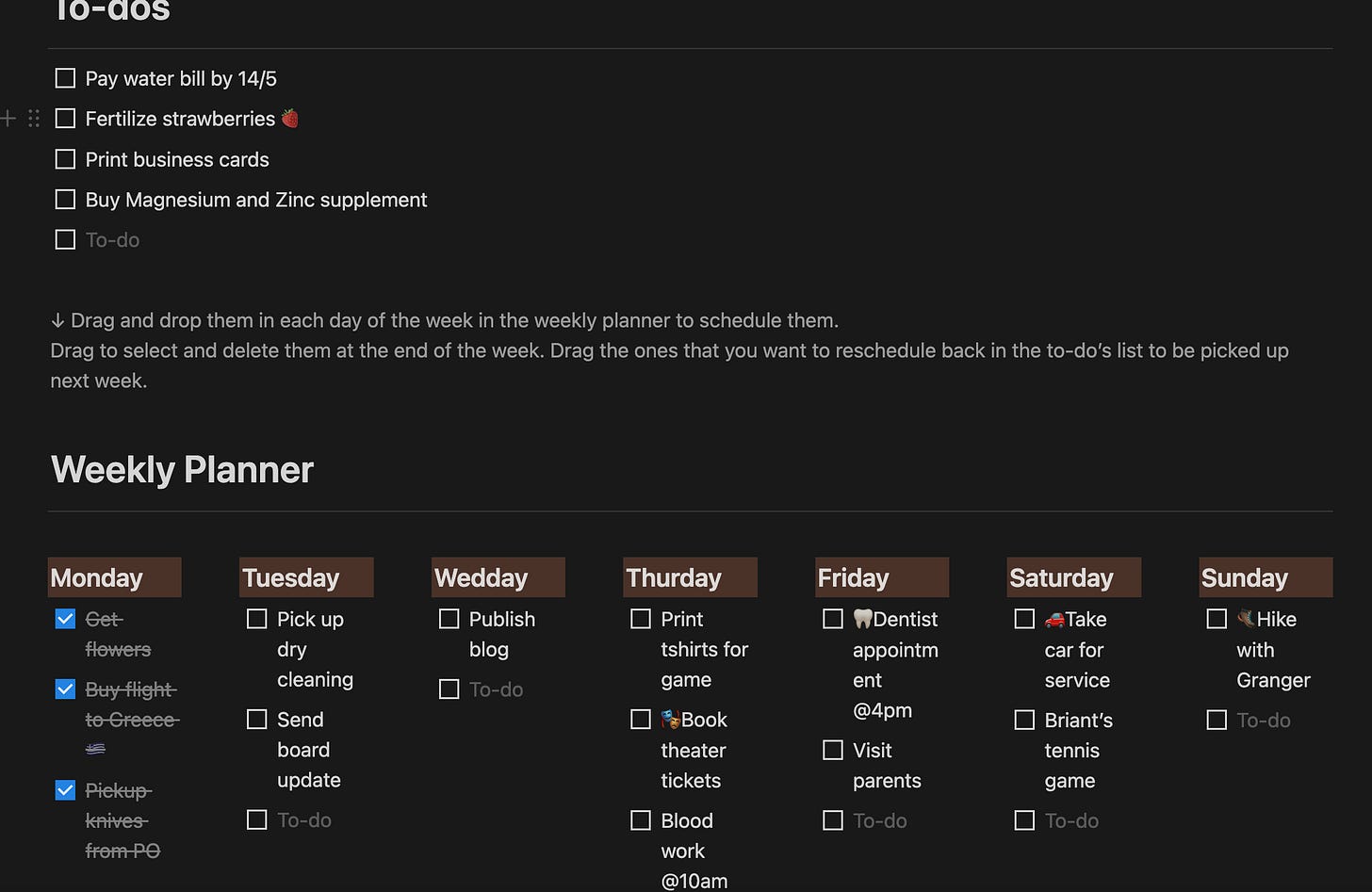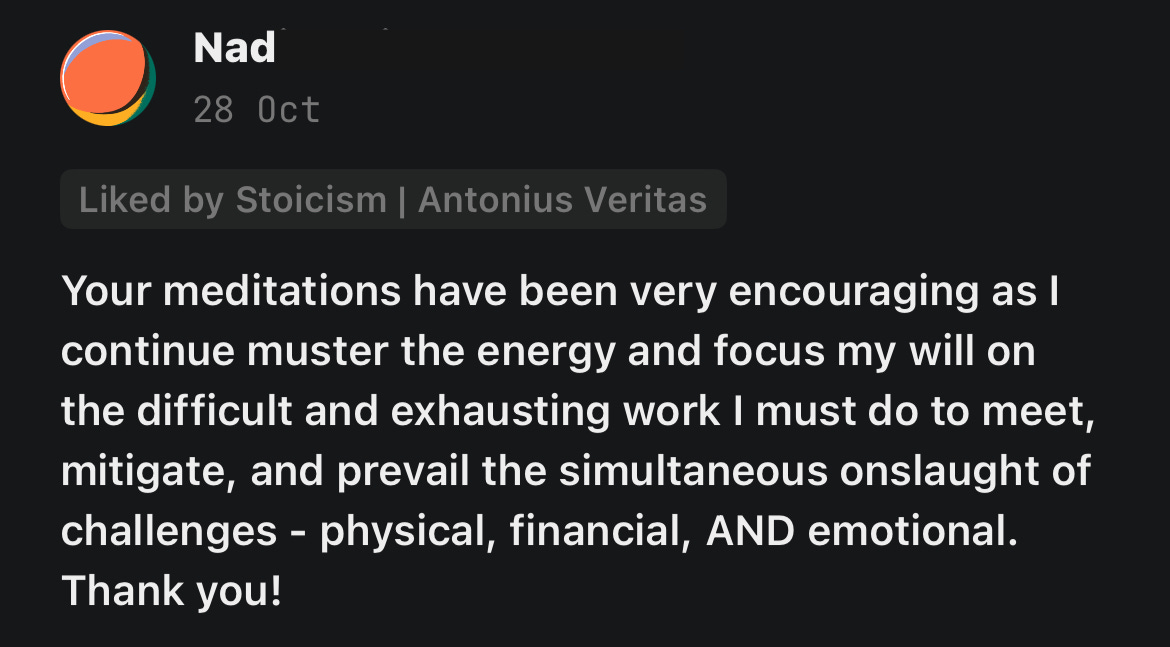LX. How to Manage Your Time
Is this making me stronger, kinder, wiser—or is it draining me of the energy I need to build my best life?
The ‘Neuroscience-based Tools’, ‘Lead to Win’ & the Le Monde Élégant social skills sections are companions for The Stoic Manual to help you get wealthier, happier & more powerful by boosting your stress resilience, discipline, focus, motivation, overall health, relationships, and leadership skills—by Dr. Antonius Veritas.
P.S: Skip to the bottom for a Time Management Mini-course, and a step-by-step guide on How to Plan Your Week Effectively + a Bonus Weekly Planner Template. Worth $5,000.
“Many times an old man has no other evidence besides his age to prove he has lived a long time.”—Seneca
We’re quite strict with our budgets and clinical with where we invest our money.
But time, which is non-renewable, we spend without knowing the balance in our account.
We spend it freely, thoughtlessly, like a bottomless resource.
We assume there’s more waiting for us—more minutes, more hours, more chances—but what are we truly getting in return for the time we spend?
What are we building with it?
Of course, one could argue we are erecting a fine record of regrettable decisions—but how proud can we truly be of that? It’s dysfunctional.
The uncomfortable truth is that we rarely stop to measure how we use our time.
Maybe it’s because the trade-offs feel invisible.
No doubt, there are moments we’ve spent wisely—creating work that feeds our ambitions, nurturing relationships that make us feel alive, or simply finding joy in being ourselves.
These moments nourish us; they’re investments in something real, something lasting.
Last week’s entry:
But, a lazy hour on social media, indulging addiction, looping thoughts about things we can’t change, a pointless argument, a procrastinated project—they don’t scream their consequences right away.
They don’t announce themselves as wasted.
But over time, the small leaks in our day add up, leaving us wondering where it all went and what we have to show for it.
And yet, the mind has a marvelous talent for turning such moments into a well-curated collection of justifications.
Don’t you think it’s time this stopped?
The truth is that we are what we do with our time.
Every decision—whether we spend it scrolling, creating, loving, or procrastinating—is an act of self-definition.
It’s how we write the story of our lives, moment by moment.
And we only get one draft.
Regrettably, no editor will appear to suggest we fix the pacing or tighten the plot.
Maximus, from the film Gladiator said it best,
"What we do today echoes in eternity."
I understand it’s tempting to ignore the cost.
Something deep inside us wants to believe that time is infinite, that a little waste here and there doesn’t matter.
But the problem isn’t just the wasted minutes.
It’s the way that mindset bleeds into everything else.
It makes us lazy with our goals, careless with our actions, inconsiderate with our relationships, and blind to the bigger picture.
The good news is, we have the power to change this.
We can stop, right now, and ask ourselves some questions.
What am I giving my time to?
What am I getting back?
Is this making me stronger, kinder, wiser—or is it draining me of the energy I need to build my best life?
These are hard questions, but they’re the ones that lead to clarity.
Clarity changes everything.
It’s what allows us to see the difference between living and just existing.
It reminds us that every hour can be more than just a placeholder—it can be a piece of something real.
Time spent writing, creating, working toward a dream, or even resting with intention feels different because it gives back to us.
It nourishes us, strengthens us, pushes us forward.
Because that’s what this is about—building something worth having.
What’s worth having?
That’s a harder question.
But we know the answer when we feel it.
It’s the quiet satisfaction and joy of a creative project coming to life, the thrill of chasing a vision we believe in, or the peace of connecting with someone who truly gets us.
It’s standing in alignment with who we are and what we want, uncluttered by guilt, useless pressure, distractions, or insecurity.
Although, to be fair, alignment would feel far more achievable if distractions weren’t so annoyingly charming.
When we live this way—intentionally and unapologetically—we start to see the bigger picture more clearly.
Petty insecurities?
They lose their grip.
People’s bad behavior?
That’s their business, not ours.
Social media spirals?
They suddenly feel small, hollow, beneath our attention.
What we then realize is this.
Time is something to protect because once it’s gone, we don’t get it back.
Though one might argue that guarding time is, in itself, another way to spend it, so let’s try not to overthink this paradox.
And yet, guarding time isn’t about shutting the world out.
Some of the best moments are when we share it—when we make space for connection, collaboration, or even just play.
But the key is to choose wisely.
Are the people we’re spending time with lifting us up or pulling us down?
Are our conversations meaningful, or are they just self-centered noise?
When we ask these questions, we elevate into the sublime plane of interconnectedness.
Self-control and courage, the ability to choose our actions and thoughts deliberately and fight for the good life we deserve, propel this practice.
Not gratifying every impulse doesn’t weaken us; it makes us stronger.
Resisting what’s easy—distractions, indulgences, or fleeting comforts—is how we grow.
It’s how we make space for what lasts.
And that’s where progress lives.
Though let us not forget that the occasional indulgence in icecream can also have a curious ability to "grow" us in unexpected ways.
Progress is addictive.
Even a little of it makes us want more.
It connects us to something larger than ourselves.
And it’s about doing something today, however small, that moves us forward.
Reading a page, making a plan, practicing a skill.
These small wins build momentum.
Over time, they remind us that we’re capable of shaping our lives into something extraordinary.
But we must also admit that the kind of person we want to be would probably also suggest we sit up straighter and stop slouching while reading this.
Let’s not mistake time management for a life of endless hustle.
Rest is part of the process too.
A moment of reflection, a good book, a movie, a conversation that leaves us feeling understood—these are just as valuable as hours spent chasing our ambitions.
So, dear reader, are you spending your time well?
Are you investing it in the people, the work, and the ideas that make you proud to be alive?
If the answer is yes, you’re on the right path.
And if the answer is no, the beauty is that you can choose differently.
Right now, in this moment, you can shift.
you can stop wasting your life and start building an interesting one.
Because every second you’re given is an opportunity to create something cool.
And if it turns out that the something you’ve created is more chaos than marvellous, at least it will make for a lively story.
Just promise me not to be the old man Seneca talks about—with nothing to show for but his age.
The Practical Guide to Time Management
Managing time can feel like a Herculean task when your workdays are hyper-structured and your personal life is filled with endless obligations.
The guide below offers actionable strategies to help you take back control of your time, be more effective & productive, and able to conquer your 2025 goals.
It’s for you if you’re juggling the busyness of family, work, business, errands, or personal projects.
You’ll also learn How to Plan Your Week Effectively and get a Weekly Planner Template courtesy of Notion to make winning easy without burning out.
Let’s get into it…
Do you like this entry so far? ⭐️
Support the publication to read the rest and access 100+ practical insights and Mini-courses to help you apply Stoicism for a happier, wealthier life—Lead to Win, Optimize Your Health with Neuroscience-based tools & Stoic Essays.
Join 14,000+ other readers.
Here’s what my supporters are saying.










